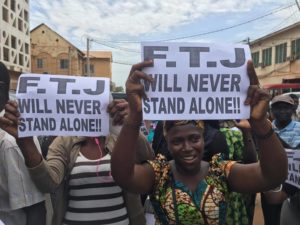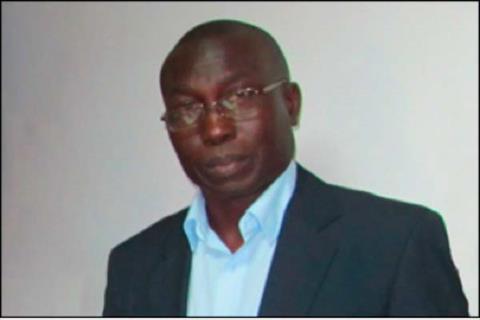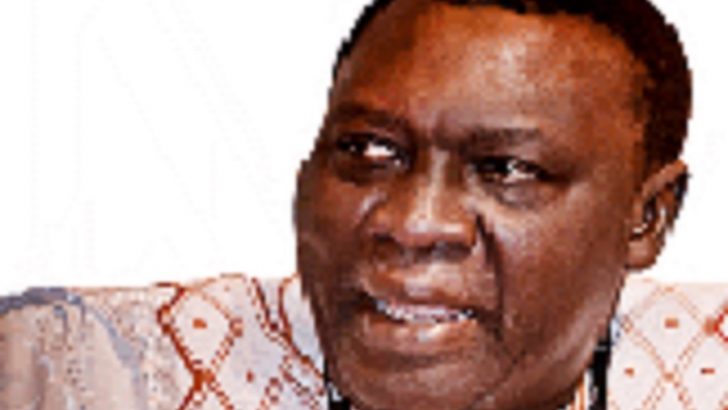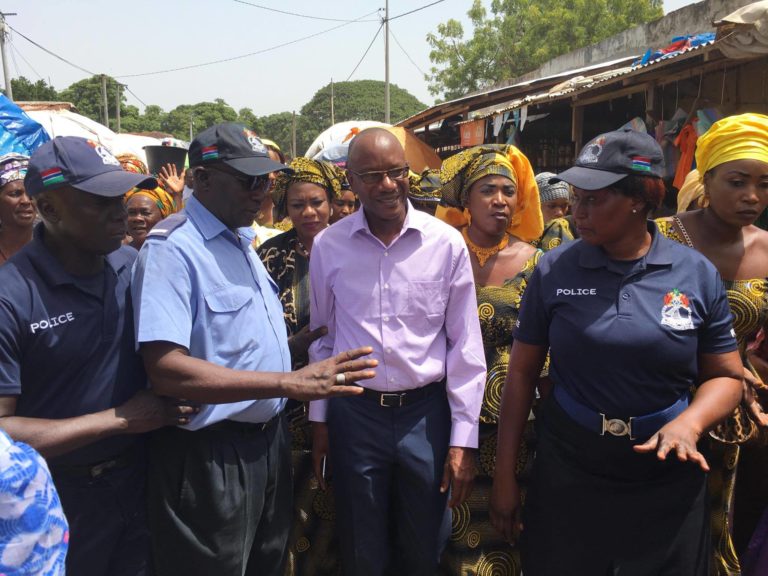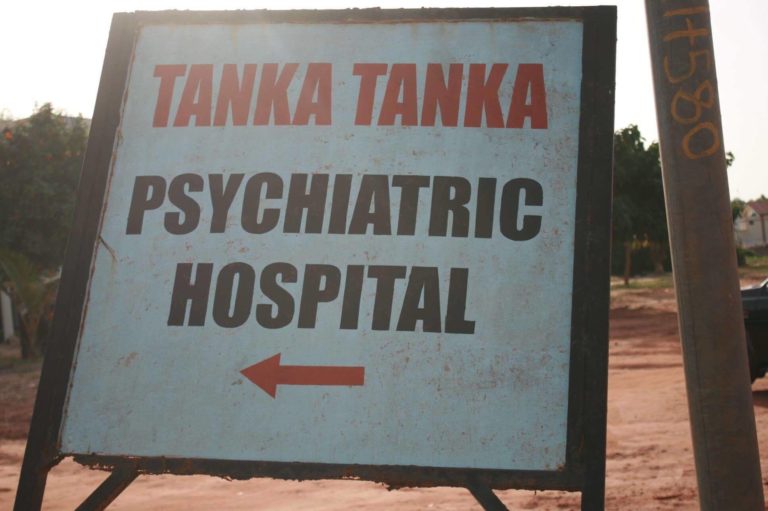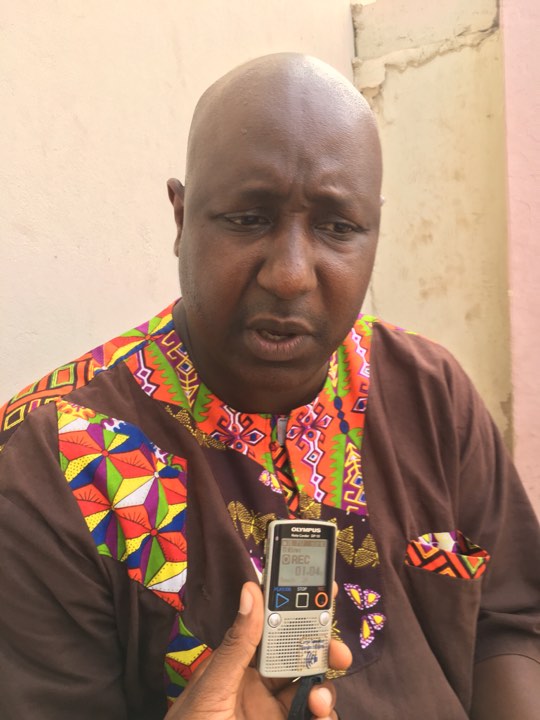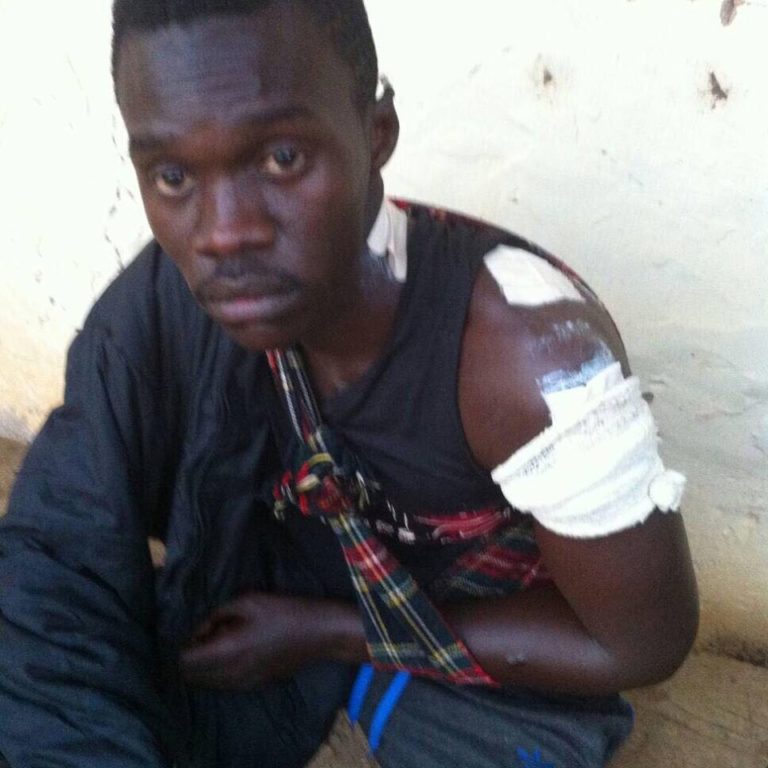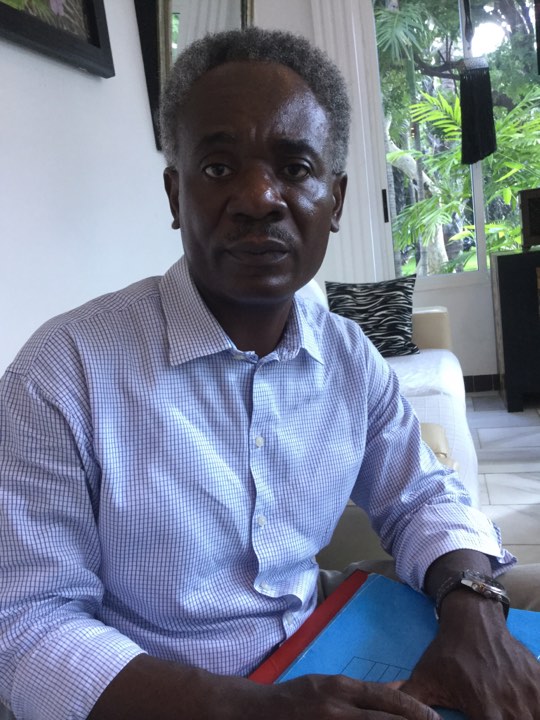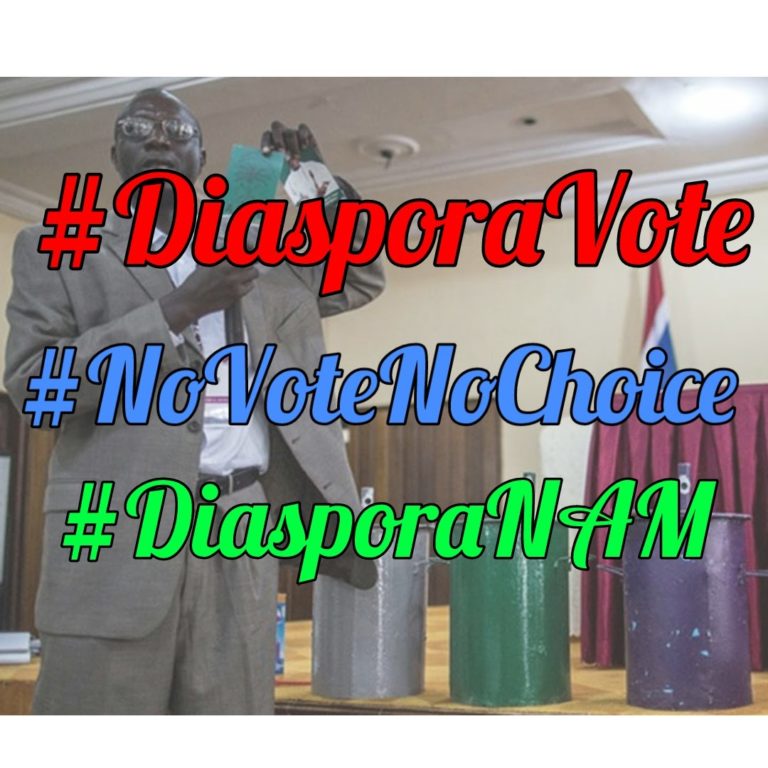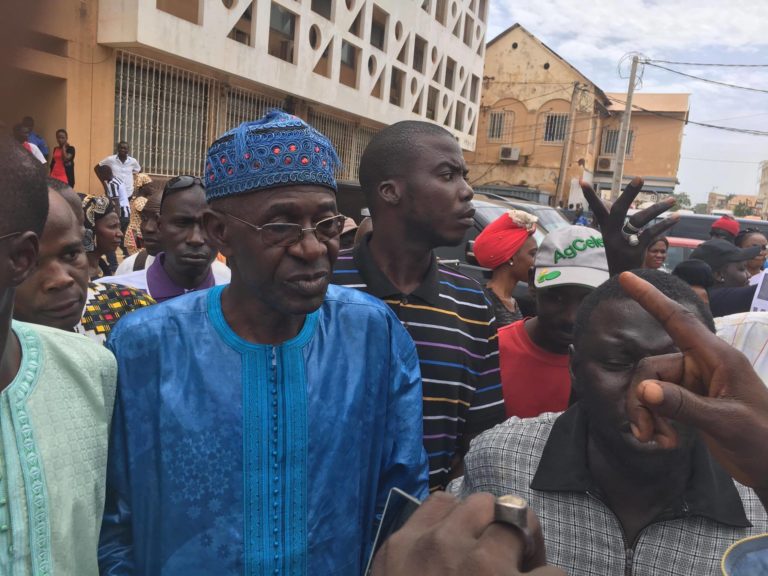Business Tycoon Muhammed Bazzi Withdraws Application to Testify Behind Closed Doors
Justice Minister Meets The Press
The Attorney General and Minister of Justice, Abubacarr Tambadou has updated the press about activities at his ministry.
The Justice Minister has highlighted several important issues including the NIA 9 Case, Truth, Reconciliation & Reparation Commission, Constitutional Review and the Commission of Inquiry among others.
He spoke about the intention of the Prosecutor General of the NIA 9 Case to come up with additional 14 new charges on top of the previous 12 counts, making it a total of 26 counts. The case, he said will resume next Monday.
Minister Tambadou also brief the press about the public consultations that his ministry recently embarked on at all the administrative regions and communities around the country to gauge the opinions and views of the Gambian people on the TRRC.
“The overall idea of establishing a TRRC received overwhelming support from the public,” Attorney General Abubacarr Tambadou said.
He spoke about the delegation comprising his Ministry, Police and other stakeholders that went for a short training in South Africa, saying they are on the final stages of the draft TRRC as the Bill will be soon passed to the National Assembly for approval hopefully before the end of October.
“All members will be Gambians of high professional integrity,” he asserted.
He added that the members will be selected from all regions reflecting national character including women, youth, religious groups and community leaders.
“It will serve a first period of two years,” he said.
The Justice Minister further spoke about a draft Bill on Constitutional Review which will be soon presented to the National Assembly. He reiterated that the review will be open to contributions from the lawmakers and stakeholders as well. He emphasized that once a Constitution is drafted it has to be subjected to a referendum.
Attorney General Tambadou also spoke about the Commission of Inquiry mandate of which is extended to a period of 6 months.
When asked whether there will be possible prosecution of those guilty of misusing public funds, he said they would rather wait for the findings, reports and recommendations of the commission which will be respected and applied to the fullest.
“We will follow the recommendations of the commission to the letter,” Attorney General Tambadou replied.
Meanwhile, he spoke about the capacity building of his ministry with the donation of new computer desktops and internet services provided to all counsels.
With Jammeh’s Executive Directives Professionalism Was Out Of SSHFC Says Edward Graham
By Fatou Sowe
The former managing director of the Social Security and Housing Finance Corporation, Edward Graham has reappeared at the Janneh Commission to further explain the various loans of millions of dalasis given out by SSHFC as a result of directives from the office of the former president.
Graham while answering to questions from Commissioner Saine on whether the corporation followed the normal procedure required by law in giving the loans, said that at the material time Jammeh’s executive directives cannot follow due procedures. Adding that he cannot go through the normal procedure with regard to directives from the office of the former president, that he said was the reason he referred the commission to the fact that they had two sets of procedures which are the normal and abnormal procedures.
According to him, the execution of the directives from the office of the former president was through the abnormal procedure. When asked by Commissioner George as to whether he was serving Jammeh or the best interest of Gambian workers, Graham who almost broke into tears said that he is part of those that built the corporation from zero to a multi-billion dalasi corporation but in the instances of the loans their hands were tied.
He further said that this is because the Social Security and Housing Finance Corporation’s Act gave too much power to the president and needs to be amended. Graham during his previous testimony made references to various sections of the SSHFC Act to back his actions, however when he wanted to continue this trend he received a caution from the chairman of the commission, Sourahata Janneh who informed him that he did not introduced himself as a legal practitioner. Janneh went on to warn that ordinarily a person who is not a legal practitioner is not compelled to answer legal questions but because of his (Grahams) act of citing various laws, the commission’s counsel (Amie Bensouda) is forced to ask him legal questions, so he asked for the wrangling to stop.
The Commission Chairman further told Graham that as Commissioners they interested in facts and not law because they will come up with the position of the law at the end of the day. However Graham insisted that he wants to be permitted to defend his actions with the SSHFC Act 2015.
According to Graham, on September 27 2015, they (SSHFC) received directives from the office of the former president for the purchase of tents amounting to D88 Million and Central Bank of the Gambia served as guarantor and that this amount was eventually paid by CBG.
Graham also told the Commission as per the Act, the governing board of the SSHFC has no mandate to approve or disapprove directives from the minister of finance much more directives from the executive (office of the former president).
On the NAWEC loans, he further informed Commissioners that in their efforts to recover the outstanding debts they met the NAWEC management. He produced documents relating to the debt repayment agreement between the corporation and NAWEC which were admitted as exhibits.
On the loan for the purchase of fire and emergency vehicles, he said he was called to the state house by Dr Njogu Bah for the safety and security of the Banjul International Airport and the Corporation was asked to give a loan which will be refunded but he requested that they (office of the former president) write a formal request letter.
Documents relating to work-about board resolution of the NAWEC, Fire tenders and ambulance transactions were admitted as exhibits. He said he did not have a board resolution on the loans for the Tobaski rams and the state aircraft.
Graham also produced letters relating to actions the corporation adopted for the repayment of the loans which were admitted as exhibits.
Gambia To Play Former President’s Host Country
The Gambia Football Federation (GFF) what’s announced that it has finalised arrangements for a friendly international football match between the Scorpions of The Gambia and the senior national football team of Guinea Equatorial in the November international break.
The match with will be played on Tuesday, 14th November, 2017 at the Marbella Football Centre Stadium in Spain. “The Gambia will use the friendly as its final technical preparatory game ahead of the resumption of the 2019 AFCON qualifier at home to Algeria in March 2018 when the Scorpions will host the Desert Foxes at the Independence Stadium in Bakau.
There is no other international window after November until March, 2018,” said The Gambia Football Federation. Since the financing of all category National Teams are now solely the responsibility of The Gambia Football Federation, the football body said the Scorpions couldn’t participate in any of the last two FIFA windows because of the heavy financial demands of such matches.
“In fact, the National Women U-17 Team left Banjul today for Sierra Leone where they will entertain their hosts in the qualifiers of the FIFA U-17 Women World Cup, while their counterparts at senior level will face off against Burkina Faso, all these at the expense of the Federation.”
Ex-NIA Boss & Co May Face Fresh Charges
By Omar Wally
Gambia’s Justice Minister Abubcarr Tambadou, said he has been informed by the Prosecutor, handling the case of former NIA boss Yankuba Badjie & CO ,Antouman Gaye, that he intends to file a motion to amend the indictment in order to increase the number of Counts to 26 from the initial number of 12.
Badjie, Louise Richards Leese Gomez, Saikou Omar Jeng, Baboucarr Sallah, Yusupha Jammeh, Haruna Susso, Tamba Mansary, Lamin Darboe and Lamin Lang Sanyang are jointly charged with offenses ranging from Conspiracy to commit murder, murder, assault causing actual bodily harm, conspiracy to commit a misdemeanor, forgery and making documents without authority.
Tambadou made the disclosure Monday, October 9 at the Ministry of Justice during a press briefing.
Tambadou said the case involving the former NIA boss will resume on Monday 16 October 2017.
He said the Ministry of Justice is now drafting a bill on the establishment of a Constitutional Review Commission which shall be presented before the National Assembly at the earliest opportunity.
‘We are now at the final review stage of the draft TRRC bill. We spent a considerable amount of time on the bill working with experts in the area of transitional justice and truth commissions in particular’ Tambadou said.
Media free under President Barrow but…
Veteran journalist Pap Saine and country representative of global journalists association Reporter San Frontier RSF, has said though the media is now enjoying freedom under the new administration in The Gambia there are still numerous challenges that need to be addressed.
RSF had been at the forefront in exposing and condemning the former President Jammeh’s atrocities against the media.
Speaking to journalists at his home shortly after returning from France where he attended an RSF forum for its correspondents, Mr Saine said the general situation of the Gambia’s image toward respect for the media has changed a lot positively and he too stressed that point at the meeting but the government should start committing itself to the promises they made during their campaign among which is to abolish the draconian media laws put in place by former President Jammeh.
He also recommended that the Gambia and the English speaking countries in Africa follow the footsteps of their francophone counterparts by providing subvention for the media and as well work closely with it to enhance democracy. Mr Saine also called on media practitioners to discharge their duties responsibly and without bias.
Mr Saine said the meeting of RSF recommended their top brass to meet the leaders of countries where media freedom is suppressed and to see how those countries will ensure that press freedom is respected.
Source: Standard Newspaper
Aspiring Mayoral Candidate Rehabilitates SereKunda Market Canopy
By Omar Wally
The Canopy at SereKunda Market has been rehabilitated to help both market women and their customers have a hygienic and spacious place for selling and buying.
The Canopy sponsored by Mohamadou Musa Njie alias Papa Njie, who is vying for the upcoming Mayoral seat for Kanifing Muncipal Council, was inaugurated on Saturday.
The project was built when Papa and his team took part in the cleaning of the Serrekunda Market; an initiative of the Women Empowerment’ Project.
Speaking at the inauguration, Njie said him and the team were invited to the market for cleaning by the women empowerment project and it was there that he encountered the deplorable state of the old and leaking canopy.
Njie explains that the conditions these hardworking women and men face on a daily basis whilst trying to provide for their families compelled him to take a swift, deliberate and decisive action.
“I’m a true believer in hard work, these business people are vital part of The Gambian economy and our everyday life.”
Njie: In new KM under my leadership, we will implement sustainable solutions, which will transform the way we handle waste which will create jobs for youths, women and the disabled.
The market renovation he said is a tiny part of his vision for a new Kanifing Municipality.
Jammeh’s Rampant Corruption – Recovering the Stolen Millions
UDP Press Statement: Tribute To Our Fallen Heroes
We humbly ask The Gambian people to join us in praying for our late colleague and brother Lamin Manjang who passed away two weeks ago.
Mr Manjang was a respected family man and a patriot of the first order. He was a pillar of the UDP as a dedicated founding member and a courageous freedom fighter who willingly and selflessly staked it all to help end tyranny.
He was arrested alongside the others in the party leadership that protested the brutal murder of Solo Sandeng. He was maltreated together with his compatriots while imprisoned resulting in lingering adverse consequences even after their release. Like fellow inmates Ebrima Solo Kurumah, Lamin Marong,Ebrima Janko Ceesay, our late comrades did not live to see the full fruits of the democracy they helped birth through blood, sweat and tears.
We pray for Allah the Almighty to bless their souls and give their immediate and larger Gambian families patience and infinite blessings.
They and many others have helped free a nation and replaced the brutal tyranny that inflicted untold suffering on our nation and its people with a plural functional democracy where all Gambians are free. That is legacy worthy of their individual and collective honor and sacrifice.
A grateful nation will never forget all that gave it all for the liberation of our great nation. UDP SECRETARIAT, BANJUL THE GAMBIA.
Legal Practitioners Amendment Bill Passed By National Assembly
The National Assembly has unanimously passed the Legal Practitioners Amendment Bill at the Legislative Chambers in Banjul.
The amended bill has increased the Bar Association membership to 4 seats in the country’s 9 member General Legal Council among other things.
Speaking to the country’s lawmakers, the Attorney General and Minister of Justice Abubacarr Tambadou has emphasized the importance of expanding the democratic space by preventing any attempt of power abuse in the New Gambia.
Attorney General Tambadou strongly articulated his disapproval of the office of the Attorney General to be the sole signatory to bills approve by the National Assembly to become laws.
“Why should you allow the Attorney General to be the sole signatory,” Justice Minister Abubacarr Tambadou asked.
“It is a tool for abuse,” he added.
The Attorney General said concerns should be raise to stop the abuse otherwise the trend would continue for any subsequent Attorney General in the future, saying the new government is very prepared for self regulatory reforms.
Member for Serrekunda, Halifa Sallah asked why the Chief Justice and the Attorney General who are both government officials are also be the Chairperson and Vice Chairperson of the General Legal Council, saying one of the positions should be given to the Bar Association. It was explained to him that the Chief Justice is the highest office of the judiciary while the Attorney General is technically head of the Bar and also principal adviser to the President.
The Member for Wuli West, Honorable Sidia Jatta on his part commended the bill noting that law students should spend adequate time with experienced practitioners before representing people in courts.
Member for Upper Fulladu West, Honourable Dawda K Jawara also spoke about the need to encouraged homegrown membership of the Bar. He commended the amendment on the Attorney General’s sole signatory to assent laws.
He added that the bill should be formally passed by deputies and assented to by the president to become law instead of the Attorney General’s signature.
Health Expert Reveals The Main Culprit Behind Mental Illness Among Youths In The Gambia
By Yunus S Saliu
The rise in the number of mentally ill youth moving around the streets is now a great concern to every parent especially in the Greater Banjul Area. It is not only their unfriendly looks, shabby dresses or the hallucinations but because of the alarming rate of the ages involved.
The causes of mental illness is alleged to be common substance abuse as some of them might have in one way or the other abused drugs and alcohol.
What these people take sometimes is not limited to the popular ‘African grass’ widely known as marijuana as some of the youngsters have gone beyond that and got so addicted that they cannot control the use of them.
On a visit to Tanka Tanka Psychiatrist Hospital by The Fatu Network, Saffiatou Kinteh, Deputy Matron at the hospital disclosed that the number of both male and female that are mentally ill in our society is alarming because “every day you find one new mentally ill patient in the streets who needs attention.”
She explained that though psycho condition comes in different ways, a lot of factors can trigger the condition but five out of ten patients in the streets have abused drugs or alcohol for a while that could break them down immediately or letter.
More of these mentally ill youth are in the streets because they lack care and attention, at the initial stage they are hardly detected as they look clean, gentle and calm.
The matron added that lack of awareness about psychiatrist hospital also contributed to them being in the street hence it is the belief of some people that whoever is admitted in the psychiatrist home is a lunatic. And again, she explained further that, it is common among people to always take mentally ill patients to traditional healers to seek for treatment rather than taking them to psychiatrist hospitals.
Tanka Tanka Psychiatrist hospital is a referral hospital that admits mentally ill people free of charge once they have a referral from the main hospital – Edwards Francis Small Teaching Hospital.
Also, the capacity that the hospital can accommodate is limited but because of the alarming rate of the mentally ill people in society, the hospital sometimes goes beyond the actual number.
Saffiatou called on the government, NGOs and individuals to come to the aid of the hospital, the place needs more help especially in the area of maintenance, drugs, toiletries, security, clothes, food and other relevant things.
She added that it is difficult for the hospital to get assistance because of neglect saying she hopes and prays that the current government comes to their aid “because without assistance it will be difficult to handle the patients and we need different things to make the place conducive for both of us,” she disclosed.
GDC Stands In Solidarity with APRC, Calls On Gambia Police Force To be Neutral
By Omar Wally
The Gambia Democratic Congress has condemned in the strongest terms the questioning of APRC interim chairman Fabakary Tombong Jatta, by The Gambia Police Force.
Hon Tombong Jatta, was last week invited to the police headquarter in Banjul for questioning following the remarks he made, which the police say could create instability in the country.
The interim leader of The APRC was accompany to the police headquarters by APRC party heavyweights, supporters and sympathizers. After a few hours of questioning, he was released without charge and APRC supporters later took to the streets carrying placards and chanting “Fabakary Tombong Jatta, will not stand alone.”
Gambia Democratic Congress, leader Mama Kandeh, who is currently out of the country, delegated a member of his executive to pay a courtesy call on The APRC party leader to show solidarity.
Demba Sabally, an adviser to Mama Kandeh, said the purpose of their visit was meant to show solidarity to The APRC and their leader. “We are here to condemn the actions of the police, for inviting political leaders and questioning them for statements made at political rallies.”
Sabally said such actions should stop noting that The Gambia Police Forces should be a neutral body. “We understand that political leaders should make responsible statements, but they should not be censored too.”
APRC leader Tombong Jatta, said he is not surprise by GDC’s courtesy call adding that he expected it. “I am deeply touched” he said.
“After my questioning by the Police, GDC leader called me from Germany, some other GDC members called too and expressed concern.”
Jatta who served at the National Assembly for ten years as majority leader, said the beauty of democracy is pluralism and allowing dissenting views. “It is always dangerous when those voices call for war, but if they call for progress, peace and prosperity people should listen.”
Journalist Seeks Assistance For Medical Treatment
By Omar Wally
Journalist Mamour Mbange, a former investigative reporter with Foroyaa Newspaper, is seeking assistance to undergo medical treatment.
Mbenga who is now a student at Gambia Press Union, School of Journalism said he was mishandled by security personnel while covering April 14 and 16 protest in 2016.
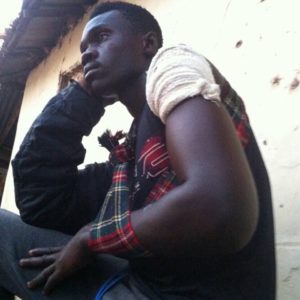
“I was manhandled by some security personnel, at Westfield while covering late Solo Sandeng’s protest; I was beaten with batons for taking pictures of the protest.” He was then admitted at Serekunda Hospital and discharged the following on the April 15, 2016.
“And on April 16, 2016, I went to cover another demonstration organized by UDP Secretary General Ousainou Darbo, and on that day, I was assaulted by some security personnel while corresponding for RFM Radio in Senegal.”
In that protest he said his leg and arm were broken, adding that the security personnel used rifles to hit him. “An insider informed me that the defunct NIA were looking for me, because I had an interview with Solo and they want to know what he (Solo) told me during the interview.”
He later went into hiding for a week and while trying to leave the country, he was arrested at the border and taken to the NIA office.
“I was taken to the interrogation room where I was questioned. When I refused to give answers to some of the questions they asked me, I was beaten and later released.”
Mbenga: My leg and arm are treated now. The problem I have is body pain and at times, I get unconscious and bleed he said.
“I’m appealing to the general public to help me with funds so that I can undergo medical treatment.” Anyone willing to assist can contact him, on +220 244 2423.
Sports Minister Defends Move to Appoint New Sports Council Chair
Janneh Commission Extended By 6 Months
Gambia’s National Assembly has extended by six months the commission of inquiry probing into the financial activities of the former President Yahya Jammeh and his close associates.
Abubacarr Tambaedou, Attorney General and Minister of Justice has moved the motion calling for the increment of remuneration for the members of the commission of inquiry headed by Surahata Janneh with two commissioners Bai Mass Saine and Ms Abiosseh George.
The commission was first mandated to complete its inquiry within a period of 3 months but could also extend when it feels necessary which request was made to extend it by 6 months after the 3 months expired.
“We therefore request this August Assembly to consider and approve the increment of remuneration to an additional amount of D500, 000 for each of the said commissioners,” Justice Minister Tambadou said.
Among the reasons given was the emergence of new evidence which warrants calling of more witnesses to testify before the commission including numerous public enterprises, bodies and offices that are the subject of the inquiry but are yet to be heard.
“The nature and complexity of the investigations covering a period of over 22 years,” he added.
The justice minister further spoke about the nature and complexity of the evidence adduced by witnesses which would necessitate the procurement of the services of forensic accountants as well as auditors.
Several National Assembly Members commended the findings of the commission and supported the motion but still some questioned the source of the funds which the minister directed them to the Ministry of Finance.
Meanwhile, the motion was approved by all the members of the National Assembly.
President Barrow, Let’s Start With The Basics
Last month President Barrow met with International Medical Services (IMS), excerpts of the subsequent press release read:
“President Adama Barrow yesterday received a team from International Medical Services (IMS), an Israeli group specialised in providing health care services in Africa…group was committed to promoting health tourism in The Gambia, and was set to build a 220 million Euro modern 350-bed hospital. He said the hospital would likely result in other African countries reaching out to The Gambia for health care…The financing loan is to have a five-year grace period and would be paid between 15 to17 years after 10 years of operation. The project contract would include provision for upgrading some of the existing state hospitals and health facilities…investment in the health sector is a priority for the Barrow administration. He said the investment plan will include skills and transfer of knowledge to Gambian counterparts…The Gambian government is expected to identify a seven-hectare parcel of land for the project.“
Gambia is open for business, has been the slogan many have been touting to entice investors into the country, however, in crucial sectors like healthcare, education, agriculture and utilities, the Barrow government must align itself with investments that fulfill a development agenda and meets the hopes and aspirations of the population. One cannot have issue with any investor coming into the country, investing in legal ventures in which The Gambia will realize much-needed tax and foreign exchange revenue. However, it is imperative that investor proposals be vigorously vetted, and investors assume the cost and risk of projects that do not fulfill the developmental agenda in key sectors. A government with a virtually non-functioning healthcare system, should not encumber itself with the financial burden of a project whose primary focus is medical tourism.
The best solution for better health care delivery should be targeted to the masses. To finance a €220 million loan, the hospital will have to generate enough revenue to cover the loan repayment, interest and operational costs. Assuming that the hospital operates at full capacity 365 day per year, each of 350 hospital beds will have to generate more than D6,000/day to pay back the LOAN PRINCIPLAL ONLY; factor in the interest and operational costs, to be financially viable, that daily estimate will increase exponentially. This is cost-prohibitive for most Gambians and does not even begin to scratch of surface to fix Gambia’s health delivery and public health system.
IMS has similar projects in Equatorial Guinea in Malabo and Mongomo, according to the Human Rights Watch report on E. Guinea in 2017, “misspending on capital projects, such as the sophisticated new La Paz hospitals in Malabo and Bata that appear to be almost exclusively for the benefit of elites—rather than on primary healthcare that benefits most citizens….Doctors, nurses and patients told Human Rights Watch that Malabo General Hospital required out-of-pocket payment up front for any service, and that those who are unable to pay upfront are regularly turned away. “If people [in critical condition] don’t have money, they die,” a doctor who worked in the General Hospital in Bata said. With the limited funds allocated to the health sector, the government has heavily invested La Paz, the two modern hospitals in Malabo and Bata staffed largely by foreigners. Both hospitals are well-equipped and charge fees that are well beyond what ordinary Equatoguineans can afford to pay.”
According to Dr. Mansogo Alo in a 2011 interview with EGJustice…”for the average citizen, for instance, one night of hospitalization in the La Paz hospital in Bata is equivalent to two and a half months’ salary. Paying for one night in the intensive care unit would require that same person to work for six and a half months without eating.”
Medical tourism has become a burgeoning industry in countries like Turkey and India who have become notables in the delivery of good healthcare at affordable costs. However, in these nations medical tourism was not a health policy. Rather, these countries had robust health policy geared towards their populations, and laid the foundation for improving their health delivery systems. Medical tourism was an incidental result of those policies, as people from developing nations, and even the West, found the quality and costs attractive enough to travel abroad for medical treatment. . Medical tourism is NOT HEALTHCARE POLICY. A sustainable healthcare policy should be a bottom up approach, and primary consideration should be given to the impact it will have on the masses. No responsible government, especially in the developing world, should embark on a healthcare policy in which its citizens are only peripheral beneficiaries of large scale projects. Government should not be involved in commercialized healthcare, when the basic healthcare needs of its citizen are not met.
It is a matter of urgency that the government shifts its investments priorities and put the masses in the forefront of any policy agenda. Once the basic medical needs of Gambians are met, medical tourism will be a natural by-product of those efficient and functioning health programs.
With the daunting task of building Gambia’s healthcare institutions, there are foundational approaches that should be considered:
- Outline a robust policy with benchmarks and timeframe for attaining goals
- Increase budgetary allocations for healthcare
- Invest in smaller regional hospitals, and overhaul the existing hospitals and assure that thy have adequate material resources, in addition to well-trained human resources
- Direct resources towards disease prevention and management, sanitation, monitoring trends and public health education
- Set up mechanism for monitoring personnel performance and continuing education training.
- Allow Gambians investors with similar ventures to realize success, prior to bringing in foreign competitors
The most important aspect of healthcare delivery is ACCESSIBILITY. The Barrow government must do some serious soul-searching and decide what kind of legacy they want to leave; whether one of shiny buildings and vanity projects which most of Gambian citizens can only admire from afar and never benefit from; or an efficient health delivery system which all Gambians will benefit from. A healthy population is a productive population.
Signed,
Sohna A. Sallah
RE: UTG Ordered To Pay Entitlements, Damages Caused To Former Finance Director
Voting Rights Of Gambians Living Abroad Petition: Making It A Reality
By Yusef Taylor
Gambians in the Diaspora have issued a petition urging The Gambia’s Independent Electoral Commission to commence the process of enfranchising Gambians living abroad. The petition is available in the link below and consists of five points around the registration and voting process for Gambians abroad.
Voting Rights of Gambians Living Abroad Petition: Making it a Reality
After enduring twenty-two (22) years of dictatorship under the regime of former President Yahya Jammeh, the people of the Republic of The Gambia voted for a new president, President Adama Barrow, to lead the nation-rebuilding process of the New Gambia. Gambians living abroad played a key role in the struggle for justice and good governance that culminated in the formation of a coalition of seven political parties, which contested and won the presidential election that brought an end to Jammeh’s rule on 1st December 2016.
Although the right of every Gambian, resident at home or abroad, to vote in general elections is guaranteed in the Constitution of The Republic of The Gambia, the government under former President Jammeh failed to demonstrate the commitment and support that the Independent Electoral Commission (IEC) required to discharge its mandate to register Gambians living abroad to vote, as prescribed under Section 11 of the Elections Act of The Republic of The Gambia. As a result, a large number of Gambians living abroad have been disenfranchised and denied the right to fully participate in the affairs of their country.
The Gambia has now entered a new challenging phase, which all well-meaning Gambians, friends of The Gambia and the country’s development partners hope will set the foundation for a truly democratic country that fully subscribes to the universally accepted principles of good governance and transparency, to deliver peace and prosperity to the people of The Gambia. In this regard, the enfranchisement of Gambians living abroad is not only a right but a necessity for the consolidation of the democratic gains of the New Gambia. Like our Senegalese counterparts, Gambians living abroad should be allowed, without undue burden, to take part in elections at home.
Our Demands
We the undersigned respectfully demand of the IEC of The Republic of The Gambia to discharge, with absolute urgency, its constitutional duty to register Gambians living abroad to take part in the upcoming constitutional referendum and subsequent elections, in accordance with the Constitution and Section 11 of the Elections Act of The Gambia. Specifically:
- We ask the IEC to announce a timeline for the registration of Gambians living abroad;
- We ask the IEC to clearly spell out the registration process for Gambians living abroad;
- We ask the IEC to announce the registration centres abroad, where Gambians living abroad shall be registered;
- We ask the IEC to clearly spell out what documents Gambians living abroad would need in order to be registered to vote; and
- We ask the IEC to clearly spell out how Gambians living abroad shall vote in elections and how votes cast outside the country shall be counted.
Gambia’s Foreign Minister Denies US Travel Ban On Government Officials
Ousainou Darboe, Minister of Foreign Affairs, International Cooperation and Gambians Abroad has denied the alleged US State Department travel ban on Gambian Officials.
“I’m not aware of any travel restrictions between the Gambia and The United States,” Foreign Minister Darboe said.
“As far as I know there is no travel ban or restriction on Gambian officials,” he added.
Darboe only made mention of some Gambians in the United States who are awaiting deportation base on immigration issues and other crime related matters which he said has nothing to do with travel ban on government officials. He added that government officials have recently returned from the UN General Assembly meeting in New York where he stayed for extra days before returning home Wednesday.
He spoke about the ongoing efforts to return the country to the Commonwealth. The matter he said is subjected to assessment and will be tabled before the Commonwealth Heads of States for approval.
The Foreign Affairs Minister was questioned about the plight of Gambians abroad particularly the ones living in Europe and Libya. He was further questioned about the number of those repatriated. He was also asked whether there is any incentive to for the returnees.
Minister Darboe said they are doing everything possible without the used of force to convince the Gambian youths in those countries to come back and not to risk their lives.
“There is scheme fund for Gambians who come back voluntarily,” he said.
Darboe said one of the biggest challenges of his ministry is to convince the young Gambians to return to the Gambia.
Meanwhile, he commended the National Assembly Foreign Affairs Committee headed by Honourable Sidia Jatta of Wuli West.
“I Was Questioned Because Of A Statement I Made” Fabakary Tombong Jatta
